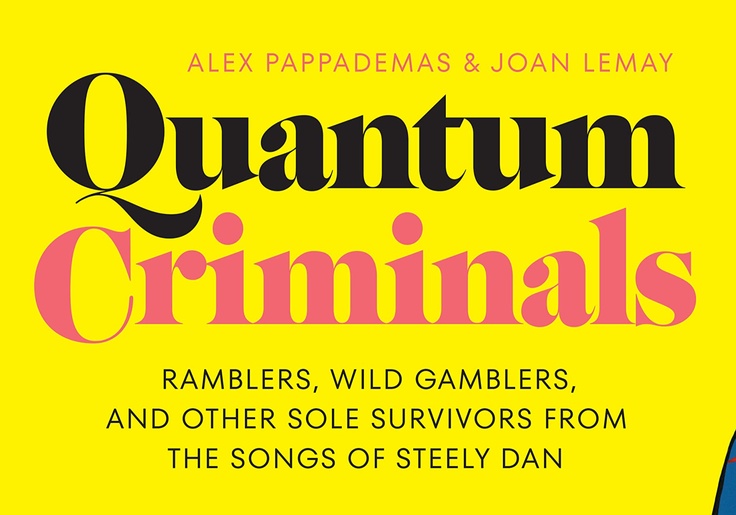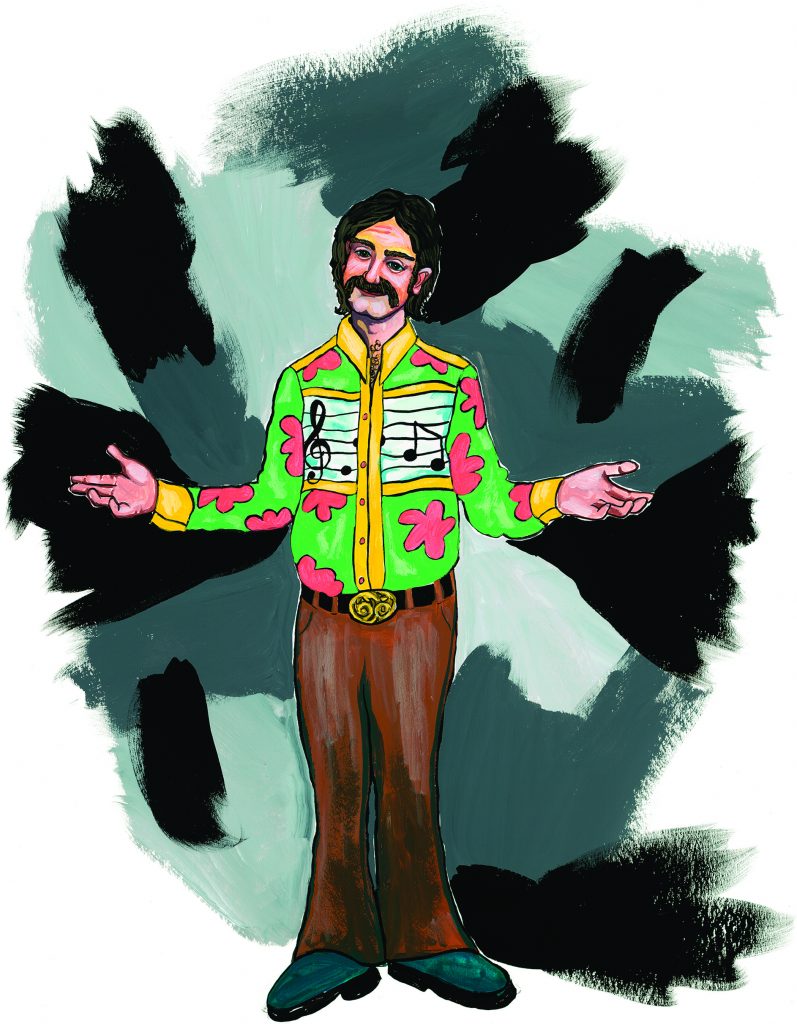REVIEW: ‘Quantum Criminals: Ramblers, Wild Gamblers, and Other Sole Survivors from the Songs of Steely Dan’

With apologies to The Big Lebowski and the Dude’s disdain for the Eagles, no 1970s American rock band is as polarizing as Steely Dan. Movie dialogue and sitcom quips have expressed the competing passions the group inspires. Friendships have frayed over the weirdos and loners, perverts and druggies who populate the songs. Siblings have sparred over the highly polished music itself, which migrated from horn-heavy guitar jams to Yacht Rock to something precariously close to smooth jazz.
Yet just as the Dude abides, the Dan endures. In fact, Alex Pappademas argues in Quantum Criminals: Ramblers, Wild Gamblers, and Other Sole Survivors from the Songs of Steely Dan that we’re in the midst of a Danaissance. Pappademas, whose "liner notes" (as the title page calls them) are accompanied by vivid paintings by Joan LeMay, contends that because younger Americans "grew up … in an age when a grasp of ontological slipperiness became a prerequisite for decoding pop culture," they are primed for the group’s "unreliable narrators and unlikable protagonists." Part of the band’s own slipperiness is its ability to get you singing along to lyrics about unsettling topics and people. The band, Pappademas says, shows "how much you can get away with if you serve up socially unacceptable ideas on a platter shined to perfection by top-drawer session dudes."
Steely Dan’s core duo of Walter Becker and Donald Fagen began making music together as students at Bard College in the 1960s. They went on to Manhattan’s legendary Brill Building to write songs for other artists before moving to Los Angeles to record their first album as Steely Dan, Can’t Buy a Thrill (1972). Pappademas suggests their debut single, "Do It Again," set the course the band would follow for the rest of its career, "sing[ing] about people who can’t help driving headlong toward one form of destruction or another."
Impatient with touring and uninterested in working with a consistent lineup, Becker and Fagen became perfectionists who’d audition a score of session musicians just for a guitar solo. (A handful of supporting members went on to have impressive careers of their own: guitarist Jeff "Skunk" Baxter and singer Michael McDonald with the Doobie Brothers, drummer Jeff Porcaro with Toto.) Their sound became more refined or, for critics, too fussy and sterile. "Sounds like it was recorded in a hospital ward," wrote one wag. They broke up after releasing their seventh album, Gaucho (1980), resumed touring in 1993, and then won the Grammy for Record of the Year when they returned to the studio for Two Against Nature in 2000. That album’s first single, "Cousin Dupree," is classic Dan: a bouncy account of a loser’s lust for his relative. Against nature, indeed. They released their last album in 2003 but continue to tour, even though Becker died in 2017.
Quantum Criminals is less a biography than a series of idiosyncratic essays about the group’s members and the characters from their songs. Pappademas reacquaints us with Peg, Deacon Blues, Kid Charlemagne, and creepy Dupree, plus guest stars like the crying squonk from "Any Major Dude Will Tell You," White House Plumber G. Gordon Liddy, the model whose profile graces the cover of Aja, and the sex toy from William S. Burroughs’s novel Naked Lunch that inspired the band’s name. LeMay’s paintings complement the writing with bold depictions of the often seedy and discomfiting speakers and subjects. Some of these portraits beg to be hung above the orange shag carpet of a conversation pit.
Pappademas’s style is lively and allusive, and his analysis is consistently both surprising and convincing. He has a knack for identifying threads that run through the band’s work and the themes of particular albums. "Most of the characters in the songs of Steely Dan’s ’70s albums," he writes, "are either longing for some vanished past or too busy losing themselves in drugs or crackpot spirituality or grasping sexual neediness to even communicate with each other, much less get it together to try to change the world." Similarly, Pappademas elsewhere refers to "the tension between [Becker and Fagen’s] fascination with contemporary perversion and violence and their conservative yearning for an idealized past," which is indeed an underrated aspect of the band’s creative output. They’re the kinky Kinks, yearning not for little shops and china cups but teenage girls who remember Aretha Franklin.
Of one of the band’s most unsettling songs, "Everyone’s Gone to the Movies," Pappademas writes that it "spin[s] the unspeakable into transgressive comedy" even as it demands "us to formulate an ethical response to what we’re hearing." In short, the moral dynamics of these songs are sometimes as sophisticated as the music. But the band’s irony meter wasn’t always well calibrated. There’s something cruel about releasing a single ("Time Out of Mind") praising the pleasures of heroin barely a year after Becker’s girlfriend died of a drug overdose in his apartment.

Pappademas traces the band’s influences—jazz musicians, novelists, peers—as well as admirers and spiritual heirs like Minutemen, Rickie Lee Jones, LCD Soundsystem, The Hold Steady, and Eminem. A remarkable aspect of the band’s influence is how many artists sampled their catalogue, including De La Soul, Joe Public, Lord Tariq and Peter Gunz, MF Doom, Super Furry Animals, and Kanye. Pappademas’s notes on this element of the band’s legacy—including how merciless the band could be with sampling deals—are especially good.
Although the book is expansive, there are some notable omissions. I would have loved an essay about "Only A Fool Would Say That," the anti-utopian song from 1972, perhaps accompanied by a painting of John Lennon, who subjected us to "Imagine" the previous year. And where in the world is "Barrytown"? Does Pappademas hear this number, which bears the name of a place near Becker and Fagen’s college, as a snarky put-down of the speaker’s hipster neighbors, or is it a denunciation of the speaker’s provincialism? He could have had fun with the song’s remarkable afterlife, too. Roddy Doyle set a trilogy of novels in a section of Dublin he called Barrytown, and Nick Hornby’s novel High Fidelity features a band with the same name. The 2000 film adaptation of that novel omitted the reference, but another 2000 film, Me, Myself, and Irene, featured popular artists covering Steely Dan songs—including "Barrytown."
As for Pappademas’s claim that Steely Dan’s point of view is especially suited for Zoomers and Millennials, older fans will hear history’s rhyme. In an essay for the band’s 1993 boxed set, Chris Willman proposed that Steely Dan deserved "the title of ‘Band of the ’90s,’ … so fluently does their oeuvre fit the temper of the times." Fagen and Becker’s "brilliantly veiled sarcasm and revolutionary lack of sentimentality," Willman wrote, "anticipat[ed] the contemporary irony craze." Pappademas seems to hint as much when he identifies Larry David as torch-bearer of the "Dan-like spirit of cultural dyspepsia and deliberate anti-charisma." (It’s a shame he doesn’t point out that the subject of another essay, the actress Jill St. John, appeared in "The Yada-Yada" episode of Seinfeld.)
Whether you count the current Danaissance as something entirely new or another turn in a recurring cycle, and even if you’re among those who find the band too weird or jazzy, it’s undeniable the Dan endures. Quantum Criminals is an entertaining and insightful account of why.
https://freebeacon.com/culture/the-vibrating-legacy-of-steely-dan/

No comments:
Post a Comment